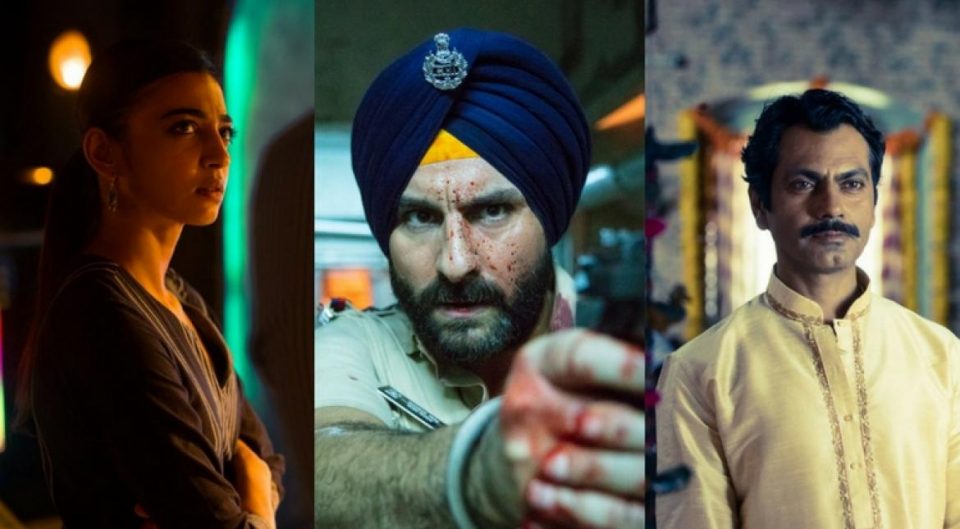Pop Stuff: Game Changers
Netflix’s ‘Sacred Games’ is more than phenomenal TV; it’s a shape-shifter
Along with legions of others my laptop was lit up every spare hour of July by diabolical gangster Ganesh Gaitonde, played to unmatchable effect by Nawazuddin Siddiqui and simmering inspector Sartaj Singh in a come-back for the books from Saif Ali Khan. As I binged the eight-episode adaptation of Vikram Chandra’s highly acclaimed 2006 novel Sacred Games, a searing evocation of contemporary India from our people to our politics to our gods, it was clear that directors Vikramaditya Motwane and Anurag Kashyap had met the challenge of creating the first Indian Netflix original with the requisite aplomb for a nation taking its global TV bow and stepping out of the confines of Bollywood. Reviews have been stellar. And fair criticism around the presentation of female characters, strong but limited in agency and backstory, will surely be improved on in a hotly anticipated second season. By setting a high bar Sacred Games is more than phenomenal TV, it’s a shape-shifter.
Chandra’s 1000-page chronicle of a Bombay that became Mumbai as the Shiv Sena rose to power is at a basic level a cops and bhais detective thriller. With Kashyap and Motwane seamlessly tackling dual story lines, the show stylishly dances between Gaitonde’s past leading to his suicide and death sentence for the City of Dreams and Sartaj and RAW agent Anjali Mathur’s (played by a stoic Radhika Apte) race to diffuse the cataclysmic event that he warns of 25 days hence. But beneath unnerving drama, slick shoot outs, bejeweled dance bars and gritty slum gullys, writers Varun Grover, Smita Singh and Vasant Nath have done justice to the source interweaving the cultural fabric of a country’s self-reckoning. The multilingual nature of the show encompassing Hindi, Marathi, English, Punjabi and Gujarati, the title cards drawing from Indian mythology, the interspersed documentary footage of a nation in turmoil and the keen attention paid to the quotidian, give Sacred Games authentic depth and rewarding breadth. The India revealed here is one worth discovering and opens our stories to a global audience whom conventional Bollywood stood no chance of holding captive.

Vikram Chandra’s 1000-page chronicle of a Bombay that became Mumbai as the Shiv Sena rose to power is at a basic level a cops and bhais detective thriller.
While the show abounds with secondary characters of Dickensian intrigue, the creators manipulate their stories as a tool for necessary social commentary. Sartaj’s right hand, the eternally optimistic Maharashtrian cop Katekar, played by a scene stealing Jitendra Joshi is our window into the struggles of an Indian middle class. In an episode devoted to Katekar’s search for a missing boy we see a man who serves a government that barely serves him back finding joy in his one room kholi amidst his wife and kids. His loyalty to the Sikh Sartaj and dismissive attitude to the Muslim family is a trademark of a city in perpetual religious crossfire. Likewise, Kukoo, a striking transgender performer played by Kubbra Sait, confronts India’s paradoxical acceptance and marginalization of the third gender. Barely a footnote in the novel, Kukoo’s pulsating role as Gaitonde’s lover delivers the series’ most heartrending scenes. Iron-fisted Kanta Bai, rage-ravaged Bunty and quietly powerful Subhadra edify as they enthrall us. Astutely crafted, Sacred Games urges a socio-political self-examination that extends beyond the entertainment value of a show like Narcos, nearing the introspective genius of The Wire.

While the show abounds with secondary characters of Dickensian intrigue, the creators manipulate their stories as a tool for necessary social commentary.
Beyond giving us much to reckon with as viewers, the show rewrites the rules for the system. In a Star driven industry where potential auteur directors only find acclaim on the international festival circuit and writers are guns for hire, Bollywood can be a recipe for creative malaise. Motwane is India’s first show-runner and in overseeing a collaborative writers room heralds a new structure for the world’s most voluminous film industry. Delivering world class storytelling, the minds behind Sacred Games have ensured that as streaming giants enter India and their wallets are rewarded, technology won’t just have disrupted the way we watch but what we watch, who gets to make it and how. In the show’s arresting opening shot a snow white dog falls several stories exuding a bloody pool as it lands in bright sunshine next to a group of school children. All that follows hits the same note; beautiful, horrific, poetic, dissonant but above all commanding that we sit up and take notice. Sacred Games is the game changer we’ve been waiting for.
Soleil Nathwani is a New York-based Culture Writer and Film Critic. A former Film Executive and Hedge Fund COO, Soleil hails from London and Mumbai. Twitter: @soleilnathwani





